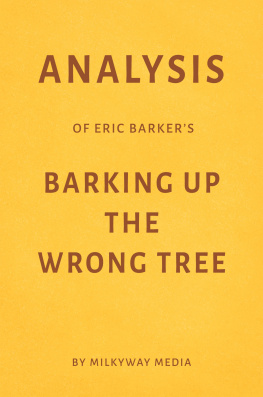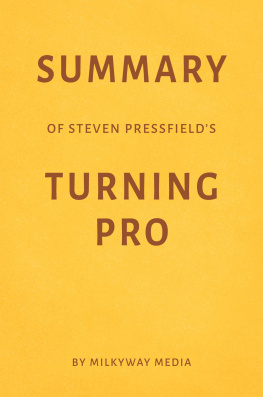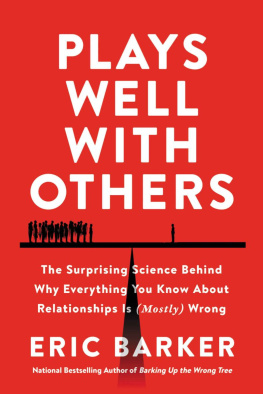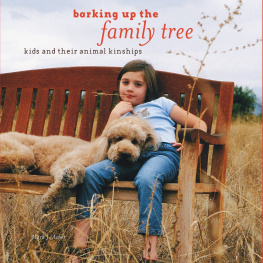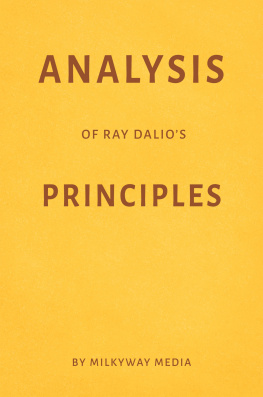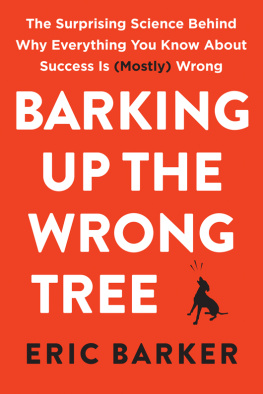Analysis
of
Eric Barkers
Barking Up the Wrong Tree
The Surprising Science Behind Why Everything You Know About Success Is (Mostly) Wrong
by
Milkyway Media
Table of Contents
Abstract
Barking Up the Wrong Tree (2017) is a humorous and insightful scientific guide to achieving success in any arena of life. It offers perspective on the occasionally surprising reasons why some people are capable of the greatest achievements and others are not. It also explains the ways in which conventional wisdom often fails to deliver success.
Before people can begin a pragmatic plan toward success, they must first know themselves well. Success is an individual mandate, which means that the way success looks for one person will not be the same for another. Attempting to rise to great heights in an industry without truly understanding ones passions and aligning them with career goals is almost guaranteed to be a fruitless task. Its just barking up the wrong tree.
However, once people know themselves and have created a realistic notion of what success looks like in their particular case, they can begin working to achieve this goal. Luck will not be the engine that powers this goal. In fact, there is really no such thing as luck; there is only hard work that creates opportunities which, to the outsider, might look like good luck or fortuitous timing.
En route to success, it is important not to embrace any absolutes of what is good and what is bad. Many qualities that would traditionally be perceived as negative can be quite useful when placed in the right context and nurtured appropriately. On the flip side, many seemingly positive qualitieslike self-confidence, for examplecan lead to negative outcomes when not properly applied in the correct measure. Awareness of their weaknesses and strengths will help individuals leverage their personalities to achieve great things.
Solid self-understanding is useful for constructing an internal narrative of success. The stories individuals tell themselves have tremendous impact on their lives, even when the stories are more optimistic than factual.
Key Points
- Each person must define success on his or her own terms.
- An individuals context affects his or her outcomes for success.
- Timeframes determine whether certain behavior is good or bad.
- Peak academic success does not typically predict real-world success.
- Internal narratives have a tremendous impact on individual capabilities.
- People who spend more time on something are more likely to experience what other people might consider luck.
- Social connections are essential to achieving success as a leader. However, a lack of social connections is essential to achieving top mastery in a skill.
- Self-confidence is not universally positive or negative. A healthy dose of negativity can keep a persons behavior in check.
Key Point 1
Each person must define success on his or her own terms.
Analysis
Success is achieved when people are able to align self-identity with their personal goals. If people do not understand who they are, they can never make this calculus and thus will never achieve success. This is because success is always relative and contextual. Too many people feel that success is unattainable because they have not really decided what, specifically, success would look like for them.
Although the vision for success is up to the individual, it cant be a pipe dream and must be grounded in reality. Until a person knows his or her life goal, its important to keep trying new things. Otherwise, time spent focusing on a single thing will be wasted. Once a person finds that passion, then its time to work harder than ever using a careful plan to action.
Failure helps a person to understand how to align personal strengths with career goals. Oprah Winfrey is considered one of the greatest interviewers and television hosts of all time, but she was fired from her first job as a local news anchor in Baltimore. She admits that she was not a great reporter; she felt too much compassion for the people in her stories, to the point where she could not bear to ask questions if they might be hurtful or upsetting. If Oprahs vision of success had been to become the best local TV news anchor in the business, she would never have achieved it. That goal would be fundamentally misaligned with who she is and what her actual abilities are. Instead, she was able to turn her deeply felt, personal sense of empathya major flaw for a local news anchorinto a positive trait for a different career. She went on to become a beloved talk show host because of her ability to connect with people and interview with heart. Since then, Oprah has reflected on this experience, stating that there is no such thing as failure; failure is just life trying to move us in another direction.
Key Point 2
An individuals context affects his or her outcomes for success.
Analysis
Nothing is inherently good or bad. However, the way that people or behaviors are nurturedor notcan make them so. Most people are like dandelions; they are hearty and able to survive in almost any environment. But dandelions are very common and unremarkable. A rare few people are like orchids. They are very sensitive and difficult but, when taken care of as they need to be, they can become astounding people. However, when not properly nurtured, they can go astray and become highly destructive and dangerous to themselves or others.
Like people, qualities can be good or bad depending on context. Certain qualitiesboth positive or negativeare called intensifiers. Intensifiers are typically traits that are seen as negative but can be a great help when used to a persons advantage in context. Take, for example, Daniel Kish, who lost his sight to retinal cancer as a baby. This adverse experience turned out to be an intensifier for Kish. He taught himself how to navigate the world using a series of tongue clicking sounds. Unwittingly, hed given himself the ability to perceive the world around him by using echolocation, much like a bat. Although completely blind, he learned to ride a bike by navigating with his clicks. Kish went on to earn two masters degrees and start an institute to teach his technique to other blind people.
Kish managed to use his blindness as an intensifier, but it wasnt luck or an accident. Without being raised in the right kind of nurturing environment, Kish might have come to understand his blindness as a negative and limiting part of his life. But Kish was nurtured appropriately by his parents. He credits his father with urging him to try out his clicking technique by riding a bike unassisted. As a result, his blindness was the intensifier that, in the right context, helped lead him to become an accomplished innovator.
Key Point 3
Timeframes determine whether certain behavior is good or bad.
Analysis
Studies show that cheating or lying can be good for individuals in the short term. However, in the long term, these behaviors erode social bonds. As a result, it is more beneficial to start a relationship in a cooperative, generous way, even if this outlook leads to short-term losses.
Understanding the value of something over time can be a helpful indicator for when to stick with an endeavor and when to walk away from it. The Wounded Warrior Project recently had to decide between prioritizing long-term goals and short-term goals. High-profile fundraisers and eye-catching campaigns helped to make the Wounded Warrior Project a household name. The nonprofit organization helps provide services and support for wounded veterans of the American military. Short-term gains were evident: the organizations efforts raised awareness and helped make an often invisible group a part of the national conversation. However, by 2016, the organization had to reevaluate whether the short-term goal of raising awareness outweighed the long-term goal of supporting veterans directly. Much of the groups money was not going directly to vets but rather to event planning and publicity. Now, the Wounded Warrior Project has a new CEO who states that the company will be a much lower-profile entity as it settles into work that provides real and lasting value to veterans. In this way, wins that had once seemed importantshort-term publicityare now recognized as less valuable in the long term.
Next page
